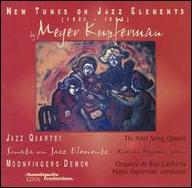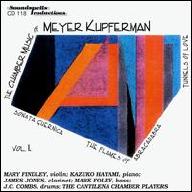Meyer Kupferman
from New York, NY
July 3, 1926 - November 26, 2003 (age 77)
Biography
Composer Meyer Kupferman's vast oeuvre embraces the spectrum of musical forms, comprising 12 symphonies, nine ballets, seven operas, and over 200 chamber or solo works that span from classical arrangements to electronic pieces, and experiments with musique concrete. Born July 3, 1926 in New York City and raised in Brooklyn, Kupferman was the son of a Romanian expatriate who traveled throughout Europe performing on his accordion and making a living as a street musician. At age five the child was given a violin, and at ten he picked up the clarinet, ultimately teaching himself piano. As a teen, Kupferman began performing in Coney Island's jazz clubs, concurrently studying compositional theory, chamber ensemble, and orchestral music at the High School of Music and Art. He later studied at Queens College, but perhaps the most profound influence on his musical sensibility was his father, who taught Kupferman the countless Eastern European, Hebrew, and gypsy melodies that shaped his later career as a composer. As his Queens College stay drew to a close, he began channeling his energies into concert music, and in 1948 wrote the first of his piano concertos, as well his first opera, the one-act +In a Garden, a work based on Gertrude Stein's -First Reader. At the age of just 25, he was appointed Professor of Composition and Chamber Music at Sarah Lawrence College, a position he held until his retirement in 1994. While at Sarah Lawrence, Kupferman conducted the school orchestra, chorus, and chamber improvisation ensemble, taught theory and music for film, and authored numerous theatrical and dance pieces; he also persuaded colleagues including Morton Feldman, Allan Blank, and Seymour Shifrin to form their own orchestra, dubbed the Composers Workshop. During the 1950s, Kupferman found himself increasingly fascinated by 12-tone composition, although he also sought avenues to maintain the melodic ingenuity of his earlier output -- his solutions included the repetition of a single tone throughout a series of pieces to create a sense of interconnection and familiarity, as well as adding elements of more traditional musical forms and aesthetics. Kupferman also retained a strong affection for the jazz of his youth, authoring a series of what he dubbed "classical-jazz" compositions, including Concerto for Cello and Jazz Band, Sonata on Jazz Elements, Tunnels of Love, and Moonflowers, Baby! Between 1961 and 1983, he also composed Cycle of Infinities, a collection of 30 far-ranging works all based on the same tone row. Kupferman died of heart failure at his home outside of Rhinebeck, New York on November 26, 2003. ~ Jason Ankeny, Rovi
Albums
Videos
Close













